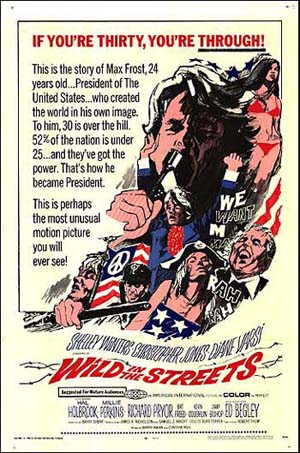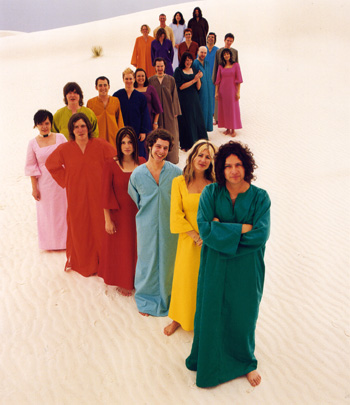
Over the years, I’ve caught snippets of Wild In The Streets (1968) on tv, but have never seen the whole the film. Much to my delight I came across the film last night while flipping through the On Demand free movies listings. The child was asleep, the wife was out of town and it seemed like a good time to take in this z-grade, teensploitation classic. Produced by Samuel Arkoff and released by AIP pictures, Wild In The Streets has all the markings of a lo-rent, b-movie trying to crossover. Appearances by Peter Tork, Melvin Belli and Walter Winchell plus starring turns by Shelly Winters, Ed Begley and Hal Holbrook all indicate the desire for this film to hit it big. But like most films from that era that try to play both sides of the fence, Wild In The Streets falls short. The film exploits generation gap politics. Hal Holbrook plays an up and coming senator with Kennedy-esque charm. He recognizes the need for the youth vote and is running for election based on the platform of bringing the vote to 18 year olds. To help his cause, he enlists the services or rock and roll star and rebel Max Frost. Frost signs on to the campaign but upstages Holbrook on national tv, calling for the voting age to be lowered to 14. This is the basis for the film’s best moment, the rabble-rousing rock anthem Fourteen or Fight (check out the You Tube clip below). Holbrook gets what he wants and then some. Frost and his stoned companions wreak havoc in Washington by enflaming the youth of America. Frost ultimately wins the presidency and in his first act as President banishes everyone over 35 to relocation camps where they are dosed up with brain-numbing amounts of LSD. In theory this movie should be awesome, but somehow it flat lines. There are certainly some great moments and great lines, but it all comes across as a little rushed and a little wooden. It doesn’t sparkle and snap like the great exploitation movies. The writing is nowhere near as sharp as in the brilliant Death Race 2000. Its biggest problem is in the character development department. Cardboard cutouts of drugged out hippies just don’t fly daddy-o. We never feel the real rage of the restless youth. The film’s characters lack believable frustrations like in Hair or Over the Edge, which mines a similar vein. Maybe it’s a good view with lots of people in the room and with the alcohol freely flowing, but I wasn’t so moved. Look for good performances by Shelly Winters as Frost’s estranged mother and Richard Pryor as the band’s drummer. Nice ending as well, as the 10 year olds get ready to rock the vote or rebel.







